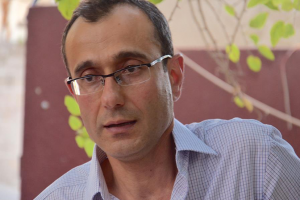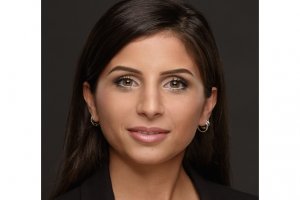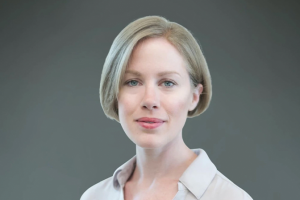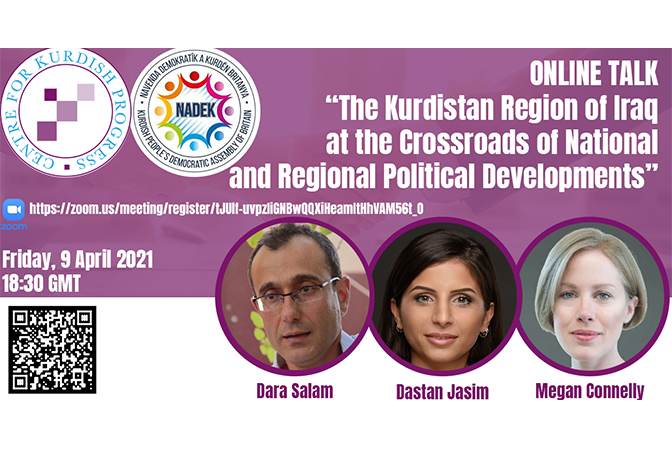Friday, 9 April 2021
6:30PM – 7:30PM GMT
This online talk on civil society and the recent domestic developments in the Kurdistan Region was chaired by Megan Connelly, a Non-Resident Fellow at the Institute of Regional and International Studies (IRIS), the American University of Iraq in Sulaimani, Kurdistan Region. Connelly also contributed to the discussion by posing questions and further elaborating on the points the speakers raised in their talk. The two panellists were Dr Dara Salam, Teaching Fellow in the Department of Politics and International Studies at SOAS, University of London, and Dastan Jasim, Research Fellow at the GIGA Institute for Middle East Studies, and doctoral student at the Friedrich-Alexander University Erlangen-Nuremberg, Germany. Connelly began by highlighting some of the difficulties that the Kurdistan Region has experienced in the past year as a result of the COVID-19 pandemic and the pre-existing financial constraints from the previous six years created by the Kurdistan Region’s budget dispute with Iraq’s federal government and the collapse of the oil prices. The budget transfers were cut, and the region could not pay the salaries of its civil servants. The recent protests in Sulaimani and elsewhere and the Kurdish authorities’ subsequent crackdown have highlighted the growing conflict between the Kurdistan Regional Government (KRG) and its citizens. This round of instability comes at a time of growing tensions within the government and between the Kurdistan Region and regional powers.
Connelly asked Dr Dara Salam to unpack the relations between the KRG and the civil society in Kurdistan Region, outline how the Kurdish authorities have shaped the public spaces in the region, and how they have defined Kurdish civil society and the opposition over time.
Salam responded by defining what is understood by public space and said, ‘it means a kind of space citizens and the society participates in’. It could cover various forms of actions, presentations, and performances. For example, it covers media, communicative actions, street protests, demonstrations, and many other forms of public participation by citizens and society. In the Kurdistan Region, public space emerged after 1991 due to the destruction of the Baath regime institutions and apparatuses. Salam said that it grew as an organic space and people’s actions and contributions were crucial to sustaining and developing it. The public space was characterised by the increasing presence of media in different formats, in which many different parts of the society can express themselves and form associations and parties. Salam mentioned that political parties could be considered part of civil society if we take Gramsci’s civil society definition. Salam emphasised that civil society organisations were created by the main political parties during the early years of the Kurdistan Region, including students, youths, women’s, and workers’ associations. He argued the organisations that were created and controlled by political parties could not be considered civil society organisation because they do not constitute the non-state space and act as civil society’s voice. In this understanding of civil society, the public space is a contested space, and political parties’ also try to infiltrate it and occupy it, which in some cases led to the dysfunctionality and diminishment of civil society.
Salam said that there is a dialectical relationship between the political parties’ efforts to control this space and society’s struggle to create the public space, which can criticise, monitor, and hold the authorities to account. Salam also highlighted that the Kurdistan Region’s political authority is divided into two centres of power and two political parties led by two families and elites. Hence, the nature of the political power is personalised, which is a replication of what happened in the broader Middle East region after the new states were formed in the aftermath of colonial rule. Salam said that the political crisis is rooted in the personalisation of state power in the region, which is a phenomenon that can be traced back to the absolutist monarchies in Europe in the 16th and 17th centuries.
Connelly drew attention to the emergence of social media and independent news outlets after 2005, and asked Dastan Jasim to address how civil society had changed since 2011 when the region first witnessed a round of protests and how the government responded to protests in the past several years.
Jasim began by highlighting that for several years during the 1990s, there was a civil war and bloodshed between the two political parties. She said that development also offers us the context of the media world. She mentioned that even if the people were critical of some of the developments, they could not communicate it to the broader society. Following the regime change and the increase in internet access rates in Iraq and the Kurdistan Region during the 2000s, a new oppositional space emerged. During the late 2000s, there was an increase in the communication between the Kurdish civic space and the diaspora. Jasim said that the people who fled the Kurdistan Region during the 1970s, 1980s and 1990s had access to communication tools, followed the developments in the region closely and developed a critical stance and were now able to communicate with the civil society in the Kurdistan Region. This was the context of the late 2000s in which the Gorran (Change) Movement emerged, and these developments influenced many people inside the main parties who were growing to be more critical of these parties.
Many people involved in the struggle against Saddam Hussein were able to come together and communicate together. During the same time as the Arab Spring protests, there were protests also happening in big cities of the Kurdistan Region, especially Sulaimani. Jasim said that all of the communication and oppositional thought that was emerging came into practice during that time, but it was also cracked down violently. Despite that, the Gorran Movement was able to win a significant number of seats at the elections that emerged at the time, became the biggest opposition party, and led the golden age of parliamentary opposition in the Kurdistan Region from 2009 and 2013. Jasim said that changes in the Kurdistan Region from 2014 onwards were triggered by the emergence of ISIS and the associated violence, and the financial crisis. The violence has made the situation harder for the opposition; before, people were oppositional and organised in parties, association, etc. In the last years, people do not believe in these oppositional movements anymore. They do not believe in the Gorran Movement or the oppositional associations. There is a significant youth population in the region, and they do not believe in these oppositional movements. Many have stopped asking for reform and are calling for a complete system change. Jasim said that oppositional thought and the relations between the state and the opposition groups have worsened and became much more violent.
Connelly reflected on the opposition movements’ choices and asked if the choice they had was about whether to stay as an opposition movement or try to influence the developments by participating in the government or interacting with the governing parties. She mentioned the changing strategies the government had used in its dealing with protests and highlighted that before, it employed more coercive tactics to discourage protests. Now it seems to be also developing a legal strategy for repressing the protests.
Jasim answered the question though discussing the Bahdinan cases of the imprisonment of several activists and journalists in the last months. She said the imprisoned activists and journalists faced specific accusations, which were very vague at the same time, and their experience shows the approach the KRG is taking in the past year. Jasim said that journalism in the Kurdistan Region happens in a non-conventional way, and there are not independent media where journalists could work and publish their work. She said that every media outlet is owned by a political party or businessperson. The oppositional people do not belong to any of these outlets. They have to use other channels to communicate to get and publish their information, which usually happens through social media.
Jasim said, on the one hand, the government and the ruling class restrict the spaces where oppositional thought is happening and being discussed. On the other hand, they take that as the reason for criminalising it. They tell these independent journalists that they are not journalists because they are not part of the officially recognised journalists’ unions and associations. Independent journalists are pushed out of the social space, and when they find mechanisms to work and publish their critical discourses, the government takes steps to criminalise them. Jasim said that what we see in the Kurdistan Region is a perversion of the language of the developed democracies to criminalise people systematically.
Connelly asked Salam about the use of crackdowns on protests and the opposition on the one hand, and cooptative strategies used by the government on the other.
Salam mentioned that it was essential to understand that the parties belonged to two ruling elites. The suppression of dissent takes different forms in Kurdistan Region. In the beginning, the parties were not very powerful to implement legal means to prosecute the oppositional journalists or citizens. Then the oppositional journalists were assaulted and, in some cases, killed. Nowadays, there is greater use of legal frameworks to prosecute and jail journalists. As the case of the Bahdinan journalists demonstrates, the government now jails them. The government’s charges are unfounded, and they use show trials because there are no cross-examinations involved. Salam gave further context to the emergence of the oppositional space and the emergence of the Gorran Movement. He mentioned certain practices of co-optation are being exercised by the KDP, which is the kingmaker in the KRG. He argued this practice is usually used by an authoritarian power rather than a democratic power and reflected on why the KDP and PUK are trying to eliminate the public space in which the journalist and the society at large try to express their opinions. He said the whole thing about the freedoms of association and expression is for the people to exercise them. In the Kurdistan Region, when people exercise their freedoms, they are imprisoned.
Connelly highlighted that political rights in the Kurdistan Region are really difficult to effectuate. She raised the KRG’s claims of ‘a foreign hand stirring the protests’ and asked about the role of the foreign powers and foreign non-state actors and whether they play any role in the domestic civil society.
Jasim said that it was ironic that the Kurdistan Region’s political parties use this excuse because historically, they have built their power base by relying on foreign powers. She mentioned that the PKK is a transnational actor and many PKK people come from the Kurdistan Region. She also said that the claim was an exaggerated excuse used by the government.
Salam added his thoughts on the matter and said accusing activists or journalists of being spies would not convince anyone inside the Kurdistan Region or outside of it. Regional powers and their intelligence services are freely moving in Kurdistan. He said that KRG has so many problems, and the claim about foreign interference is used for blaming others for its failures.
Connelly mentioned the recent agreement between the federal government and the KRG about the budget disagreement and whether it can reduce the tensions between the citizens and the KRG.
Salam highlighted that the KDP decided to sell Kurdistan’s oil independently and use the funds to build economic autonomy and pave the way towards independence. The independence referendum that was held in September 2017 has backfired. The KRG could not pay the salary of the people it employed and feed its population since the rupture with the central government in 2014. Salam mentioned that the details of the current agreement are vague, and we do not know the exact share of the Kurdistan Region’s budget. He also questioned whether the KRG is willing to hand over to the federal government its oil and its revenue. The public does not know how the agreement will work and whether the federal government will transfer the income. Salam also drew attention to the corruption in the Kurdistan Region and highlighted that the system was bloated. If the money is transferred to the Kurdistan Region, it will relieve some of the pressures, but it does not mean that the economic and governance problems will be resolved. He said that the broader issue was about fixing the broken system in the Kurdistan Region, and there is a need for radical action, but all the indications suggest that the system is going towards authoritarianism. Salam believes that people will still try to organise, and the civil society will add more pressure on the KRG. The budget agreement is a temporary solution, but it is unlikely to be the solution for what has happened in the region during the past 30 years.
The meeting continued with further questions from the audience that the two panellists answered.
Speakers’ biographies

Dr Dara Salam is a Teaching Fellow in the Department of Politics and International Studies at SOAS University of London. He has written on Middle East politics and political theory. He has published articles in academic journals and in different media outlets and has appeared on various media channels.

Dastan Jasim is a Research Fellow at the GIGA Institute for Middle East Studies, a doctoral student at the Friedrich-Alexander University Erlangen-Nuremberg, and a member of the GIGA Doctoral Programme. Her research focuses on the civic culture of Kurds in Iraq,Iran, Syria, and Turkey, as well as on security developments in the Kurdish regions.”

Megan Connelly is a Non-Resident Fellow at IRIS. She was also a fellow of the Jaeckle Center for Law, Democracy, and Governance at University at Buffalo. Her current research focuses on the legal history of local governments in the Kurdistan Region and their place within Iraq’s federal framework. Megan has previously published articles on Kurdistan Region law and political institutions for Sada and the Middle East Institute. She holds a Juris Doctor from SUNY University at Buffalo.

